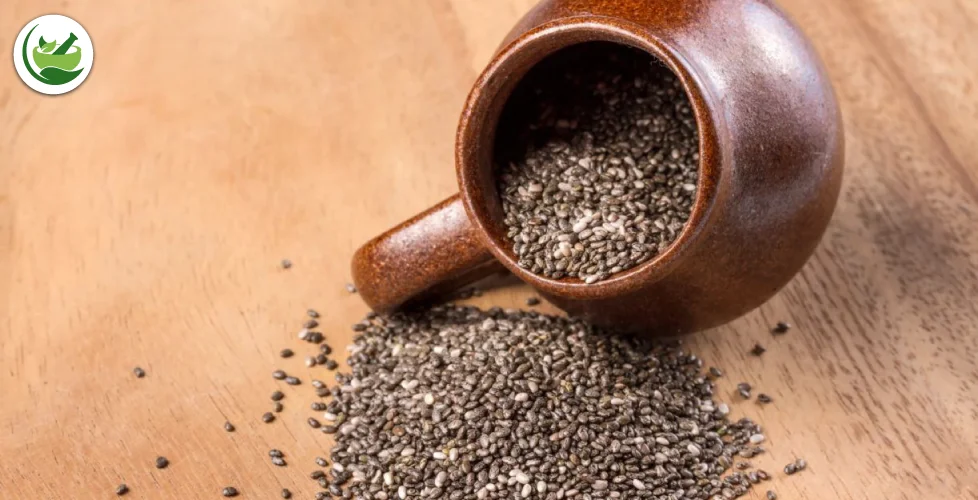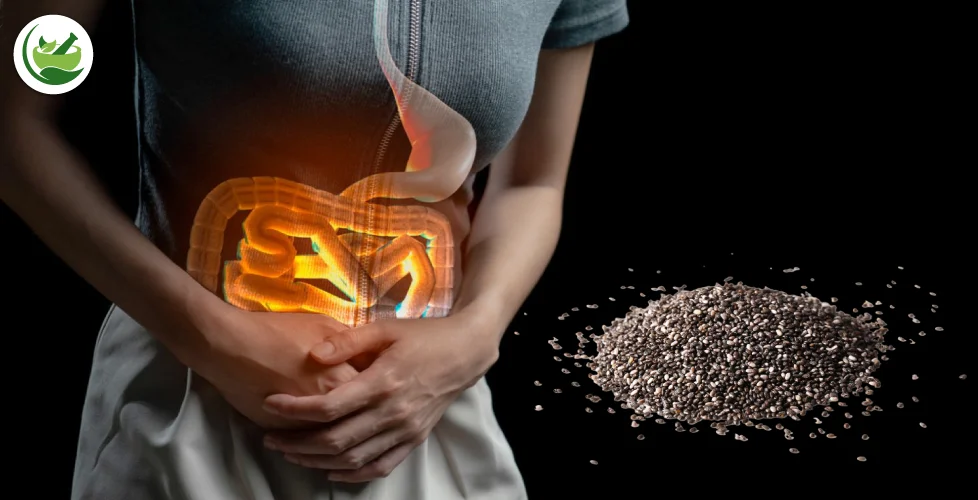Chia seeds have gained immense popularity in recent years as a superfood, praised for their numerous health benefits. They are a rich source of omega-3 fatty acids, fiber, protein, and various micronutrients. However, there have been claims that chia seeds can cause constipation. This blog delves into whether this is a myth or reality by examining the nutritional profile of chia seeds, their effects on digestion, and providing practical tips for incorporating them into your diet.
Related blog Health Benefits Of Black Vs. White Chia Seeds

Understanding Chia Seeds
Chia seeds are nutrient-dense superfoods from the Salvia hispanica plant, known for their high fiber, omega-3 fatty acids, protein, and essential minerals, making them a popular choice for health-conscious individuals.
Nutritional Profile
Chia seeds are tiny black or white seeds from the plant Salvia hispanica, which is native to Central America. They are packed with nutrients, as shown in the table below:
| Nutrient | Amount per 28g (1 ounce) |
|---|---|
| Calories | 138 |
| Fiber | 10.6 grams |
| Protein | 4.7 grams |
| Fat | 8.7 grams |
| Omega-3 | 4,915 mg |
| Omega-6 | 1,620 mg |
| Calcium | 177 mg |
| Magnesium | 95 mg |
| Phosphorus | 244 mg |
| Potassium | 115 mg |
Health Benefits
Chia seeds are a powerhouse of nutrition, offering high fiber for digestive health, omega-3 fatty acids for heart health, and essential minerals for bone strength. They are also rich in antioxidants and protein, supporting overall wellness. Chia seeds offer a multitude of health benefits:
- High Fiber Content: Supports digestive health.
- Rich in Omega-3 Fatty Acids: Promotes heart health.
- Antioxidants: Protect against cell damage.
- Minerals: Strengthen bones and teeth.
- Protein: Supports muscle growth and repair.
Related blog The Chia Seeds Ulcerative Colitis Benefits: Implications For Health And Diet
Chia Seeds and Constipation: The Mechanism
Chia seeds are highly absorbent. When soaked in water or any liquid, they can absorb up to 12 times their weight. This property turns them into a gel-like substance, which can aid in digestion. However, this same characteristic can also potentially lead to constipation if chia seeds are consumed incorrectly.
Scenario 1: Adequate Hydration
When chia seeds are properly hydrated before consumption, they expand and form a gel that can help move food through the digestive tract. This gel can act as a lubricant, making it easier for waste to pass through the intestines. Therefore, when consumed with sufficient water, chia seeds are more likely to promote regular bowel movements and prevent constipation.
Scenario 2: Insufficient Hydration
On the flip side, consuming dry chia seeds without adequate water can be problematic. When chia seeds do not have enough liquid to absorb, they can expand in the esophagus or stomach, potentially leading to a blockage. This can slow down digestion and contribute to constipation. Additionally, the high fiber content can exacerbate the problem if there’s not enough water to help the fiber move smoothly through the digestive system.

Chia Seeds and Digestion
Chia seeds are high in soluble fiber, which aids digestion by forming a gel-like substance in the stomach, promoting regular bowel movements. However, they can cause constipation if not consumed with sufficient water or in excessive amounts.
How Fiber Affects Digestion
Fiber is essential for healthy digestion. It adds bulk to stool, which helps it pass through the digestive tract more easily. Chia seeds are particularly high in soluble fiber, which absorbs water and forms a gel-like substance in the stomach. This can help with regular bowel movements.
Related blog How The Benefits Of Chia Seeds And Diverticulitis Can Improve Your Digestive Health
Potential for Constipation
Despite their high fiber content, there are instances where chia seeds might cause digestive issues, including constipation. This usually occurs under specific conditions:
- Insufficient Water Intake: Chia seeds absorb up to 12 times their weight in water. If you don’t drink enough water, the seeds can absorb moisture from your intestines, potentially leading to constipation.
- Excessive Consumption: Overeating chia seeds can overwhelm the digestive system, particularly if it’s not used to high-fiber foods.
- Pre-existing Digestive Conditions: Individuals with conditions like Irritable Bowel Syndrome (IBS) might find chia seeds exacerbate their symptoms.
Myth or Reality: Can Chia Seeds Cause Constipation?
To determine whether chia seeds cause constipation, it’s essential to consider both anecdotal evidence and scientific research.
Scientific Evidence
Research on chia seeds and digestion is limited, but some studies provide insight:
- Hydration is Key: A study published in the European Journal of Clinical Nutrition highlighted that the gel-forming property of chia seeds can aid in bowel regularity, provided there is adequate fluid intake.
- Balanced Diet: Including chia seeds as part of a balanced diet is unlikely to cause constipation for most people. However, a sudden increase in fiber intake without sufficient water can lead to digestive discomfort.
Anecdotal Evidence
Anecdotal reports suggest that some people experience constipation when they consume chia seeds. This is often due to inadequate hydration or consuming large quantities without gradually introducing them into the diet.
Practical Tips for Avoiding Constipation
To avoid constipation when consuming chia seeds, start with small amounts, ensure proper hydration, soak the seeds before eating, and incorporate them into a balanced diet. This approach helps your digestive system adjust and prevents any discomfort.
How to Incorporate Chia Seeds Safely
To enjoy the benefits of chia seeds without experiencing constipation, consider the following tips:
- Start Slowly: If you’re new to chia seeds, start with a small amount (1 teaspoon) and gradually increase to the recommended daily intake (1-2 tablespoons).
- Stay Hydrated: Drink plenty of water throughout the day, especially when consuming chia seeds.
- Soak Chia Seeds: Soak chia seeds in water or other liquids (e.g., almond milk, juice) for at least 20-30 minutes before consuming to allow them to expand.
- Combine with Other Foods: Mix chia seeds into smoothies, yogurt, oatmeal, or baked goods to make them easier to digest.
- Balanced Diet: Ensure your diet includes a variety of fiber sources, including fruits, vegetables, and whole grains.
Sample Daily Meal Plan
Here’s a balanced meal plan that includes chia seeds in various forms throughout the day, ensuring you receive their health benefits while minimizing the risk of constipation.
| Meal | Description |
|---|---|
| Breakfast | Chia seed pudding made with almond milk, topped with berries |
| Snack | Smoothie with spinach, banana, and 1 tablespoon of chia seeds |
| Lunch | Salad with mixed greens, quinoa, avocado, and a sprinkle of chia seeds |
| Snack | Greek yogurt with honey and 1 teaspoon of chia seeds |
| Dinner | Grilled chicken with roasted vegetables and a side of brown rice with chia seeds mixed in |
Related blog The Impact Of Chia Seed Benefits For Diabetes On Blood Sugar Management
Conclusion
While chia seeds have the potential to cause constipation if not consumed properly, this is more about how they are incorporated into the diet rather than the seeds themselves being a problem. By ensuring adequate hydration, starting with small amounts, and incorporating them into a balanced diet, you can enjoy the numerous health benefits of chia seeds without the risk of constipation.
In summary, the idea that chia seeds inherently cause constipation is more myth than reality. With the right approach, chia seeds can be a valuable addition to your diet, supporting digestive health and overall well-being.






